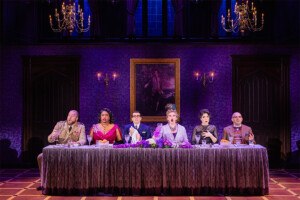An Oral History of the Mann Center
OF ALL THE CHALLENGES the Mann has faced, none has been more onerous than fickle weather.
Elizabeth Warshawer: There were nights when the weather was really pleasant, and there were nights when the weather was really unpleasant.
Evans Mirageas, artistic adviser for the Orchestra: The stage is air-conditioned, but the audience sits in sublime nature, and sometimes nature is not so sublime.
Catherine Cahill, Mann president and CEO: We’ve had lightning storms, we’ve had floods. We haven’t had locusts yet, but stay tuned.
Don Liuzzi, principal timpanist, Philadelphia Orchestra: The first night I performed, there was a hurricane, and the rain was blowing sideways. There was almost nobody there, but we played anyway. I had to play my gong mezzo forte instead of pianissimo to be heard above the howling wind.
Jane Gitomer: The drainage system couldn’t keep up, and there was just this river of water rushing down the stairs, and it flooded the seats. We were pulling people out of there like they were lost at sea.
Louis Jennings: Years ago, the Beach Boys were supposed to play the Parkway, and it rained. So they moved it at the last minute to the Mann, and just threw the gates open and made it a free concert. It was still raining hard and thundering and lightning like crazy, and midway through, the power got knocked out. Bruce Johnston and Mike Love came out and did a few songs with no microphones, no amplification, just a piano. All the people started singing along.
By the mid-’90s, the Mann had fallen on hard times due to poor management decisions and the sudden appearance of deep-pocketed competition across the river in Camden. Seeking a fresh start, the Mann hired Peter Lane away from Carnegie Hall to be its new CEO.
Joe Kluger: The Mann got a half-million dollars in contributions from the public, and it got close to half a million dollars a year from the city. It was also getting $150,000 a year from the Pew Charitable Trusts and a million dollars a year from rock-and-roll concerts. But the city was having financial problems and said, “We know we guaranteed that we would subsidize the Orchestra’s concerts at the Mann, but you know what? We’re not going to do that anymore.” So that money went away. Then Pew also pulled its funding.
Peter Lane, former president and CEO of the Mann: We owed the Orchestra over a million dollars. So I had to put an end to the free-lawn-tickets policy. By that point, the venue was extremely tired. We had policies and procedures in place that I think were antithetical to bringing new people in: We were putting notices in the ticket envelopes that said, “Warning: Do not leave valuables in car.” We were losing audience share pretty quickly.
Joe Kluger: The Mann is a wonderful place to play, but economically, it doesn’t work. Larry Magid was the key to the success of the Mann. A million dollars a year in profits from the rock-and-roll shows was used to subsidize the Orchestra’s performances.
Peter Lane: We called that “Rock pays for Bach.”
Joe Kluger: Then Clear Channel set up shop in Camden and we started losing the rock. They were an 800-pound booking gorilla, with a brand-new state-of-the-art amphitheater twice the size of the Mann.
Larry Magid: It was difficult. Because even though our relationship with the Mann ran very deep, when someone offers you a lot more money, well, you think about it. So we went back to the Mann and said, “Listen, we had this offer. We’d like to stay, but we have to change the deal,” because we just couldn’t afford to keep fighting at our own expense. We went back three or four times. There were a lot of frustrating conversations with well-intentioned people. They couldn’t or wouldn’t figure out how to change the deal. So we took the deal with the amphitheater.
Jon Hampton, senior talent buyer: After that, a lot of shows that would have played the Mann wound up in Camden.
Joe Kluger: James Taylor played there one summer. He had a miserable time and said, “I want to go back to the Mann.” It was a better facility for the kind of stuff he does.
Peter Lane: One of the big challenges was that we had cold hot dogs and warm Coke on a hot summer day, and it was just emblematic of some of the broader issues at the site. So I brought in Frog
Commissary. People complained that the parking people were a little snarly, so we got a new company in that welcomed our patrons and said, “Good evening, and welcome to the Mann.” Pieces started falling into place.


